
VOCATIONAL SCHOOL
Department of Radio and Tv Programming (Turkish)
Courses
This is a compulsory English course which provides basic language skills such as reading, writing, listening and speaking at the beginning level.
This course provides a general information of the events from the end of the 19. century until the end of the Turkish War of Independence and the signing of the Treaty of Lausanne in 1923.
Students will be taught how to use the written communication tools accurately and efficiently in this course. Various types of written statements will be examined through a critical point of view by doing exercises on understanding, telling, reading, and writing. Punctuation and spelling rules, which are basis of written statement, will be taught and accurate usage of these rules for efficient and strong expression will be provided.
Definition, purpose and importance of communication, elements of communication process, forms of communication, communication models and theories.
The implementation of audio and video technology
In this course, starting from the history of the photograph, respectively, cameras, functioning and principles of operation will be examined, photography techniques, reading, photography, lighting, composition, framing and photo location in the communication process will be discussed.
In this course, the scenario concept and stages, theme and selection, dramatic structure, character building, draft history (synopsis), development (treatment), the availability of scenario thinking with segmentation and shooting script, realization of ideas, analysis and application assignments of scenario example is the course content .
The course will help students recognize the skills needed for university life and their career goals. These skills include self-awareness, goal setting, time management, effective communication, mindfulness and analytical thinking. The course will also raise students’ awareness on problems such as addiction and bullying.
Making video editing
Cinema concepts and practices
This is a compulsory English course which provides basic language skills such as reading, writing, listening and speaking at the beginning level.
Terrestrial Television Broadcasting, Satellite Television Broadcasting, IPTV and Internet TV Broadcasting, Mobile TV Broadcasting
TV program design and implementation phases
Students will be taught how to use the written communication tools accurately and efficiently in this course. There will be exercises on understanding, telling, reading, and writing; types of speeches (panel, symposium, conference, etc.) will be introduced; the student will be equipped with information on using body language, accent and intonation, and presentation techniques.
With special reference to the Principals of Atatürk the course will examine the philosophy of the foundation and existence of the republican regime as well as the democratic developments in secular Turkey during the twentieth century and in the era of extending globalization.
Internship, covers field experience at any work place. Students should follow the instructions stated in IUE Internship Guide in order to successfully complete their internships.
The course will focus on the concepts of journalism and journalism in general terms.
In this course, the concepts on communication and society, sociology, basic concepts of communication, the effects of social change processes cases and information about events and mass media will be dealt with. Social means of communication in this context, the effects on society, society-communication relationship, the development of the historical process of social communication and its impact on my last text because the media of these will be discussed in a critical perspective.
Video applications will be carried out both theoretical and practical.
In this course, students are introduced to the basic vocabulary, terms, structures, and information in the field of radio and TV programming through various in-class activities.
Internship, covers field experience at any work place. Students should follow the instructions stated in IUE Internship Guide in order to successfully complete their internships.
Genres and formats concepts, basic and legal information on creating format.
Basic knowledge concerning audio-visual recording devices and operating methods, basic shooting angles, framing, shooting formats, theoretical and practical phases of editing process
Video techniques in theory and practice
The content of this course examines the concept of the ethical principles of professional ethics and approach, evaluates ethical issues in the media within the framework of current events.
The course aims to develop communication skills to a pre-intermediate level of prospective radio and tv programmer.
Elective Courses
RTV 104 Applied Image Technics
Student will gain competencies of image editing.
RTV 109 Media Law
Comparison of Turkish and EU media laws. Protecting the identity of news resources. Protecting personal life. Laws about radio and TV broadcasting. Limitations about advertising. Copyright.
RTV 135 Advanced Editing Techniques
In this course, students will learn advanced film editing techniques, special effects production in post-production, color grading, digital image processing and aesthetic expression techniques in post-production.
RTV 140 Basic Knowledge of Communication
Definition, purpose and importance of communication, elements of communication process, forms of communication.
RTV 203 Radio and Podcast Program Production
In this course, the emergence and development of radio and podcast broadcasting, types of radio and podcast programs, features of radio and podcast program production, materials used in production and production stages of programs will be discussed.
RTV 215 The Art of Public Speaking
Voice, diction, speed reading
RTV 216 Social Media
This course includes teaching all recent aspects of social media in both practical and theoretical ways.
RTV 217 Sound Design
In this course, students will learn the history of sound design and development, the physical properties of sound, audio recording and editing techniques, sound effects and mixing.
RTV 220 Graphic and Animation
This course, television and theater programs for / Series / Movie as the preparation of which can be used band advertisements in publications, trailer and teaser as içeirkl to rile the theory of preparation of the video presentation of the publication of the technical and practical courses.
RTV 222 Press and Documentary Photography
Within this course, historic, theoretic, ethic and technic information about press and documentary photography will be taught to the students. In the light of these information the importance and effects of press and documentary photography will be discussed and documentary photography projects will be made.
RTV 223 Film Criticism
It includes the approach of film criticism, historical criticism, auteur criticism, semiotical criticism, sociological criticism, ideological criticism, psychoanalytic criticism and feminist criticism.
RTV 225 Cinema and Society
This course includes the relationship between cinema and society and its influence on films through currents and country cinemas.
RTV 230 Internet Broadcasting
Main and technical notions of internet broadcasting will be taught to the students.
RTV 235 Creative Authorship
This course includes the techniques of storytelling, the place of the story in persuasion, the effect of art and writing in branding by having a command of the language.
RTV 240 Corporate Communication
Basic concepts of corporate communication, corporate communication activities performed for different purposes and for different stakeholders and basic principles to be considered in these activities are discussed.
RTV 250 Applied Workshop in Newswriting
In this course, basics and ethical notions of journalism, news making and writing process will be taught to the students.
RTV 260 Social Responsibility
This course includes responsibility, social responsibility, corporate social responsibility, non-governmental organizations and social responsibility campaigns.
NEWS |ALL NEWS
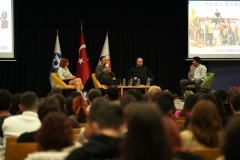
‘Mortal World 2’ actors at IUE
Sarp Apak and Ahmet Mümtaz Taylan, the actors of the film ‘Ölümlü Dünya 2’ (Mortal World 2), which has garnered significant attention
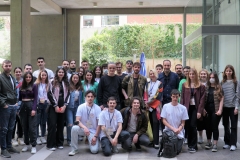
500 students met at the 'festival'
Izmir University of Economics (IUE) Vocational School held one of the biggest design and creativity festivals in the city. 500 students participating
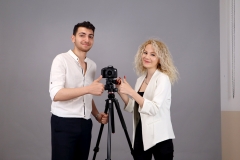
PA’s to the world-famous program from IUE
Hilal Yapıcıoğlu and Doğukan Sözen, students of Izmir University of Economics (IUE) Radio and Television Programming, worked as 'production assistants' in the
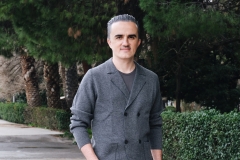
Turkish photography will be promoted in Italy
IUE Lecturer Emre Küheylan was invited as a curator and speaker to the world-famous photography festival called 'Photolux' to be held in

'Turkish coffee' and 'fortune telling' became a documentary
'Turkish coffee', which has become one of the indispensable values of our culture, inherited from centuries ago, and 'coffee fortune-telling', which many
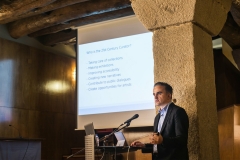
The first Turkish person in the giant jury
Emre Küheylan, Lecturer at Izmir University of Economics (IUE), who has works that made a difference in photography, whose works are exhibited
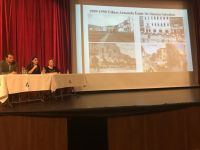
IZMIR CINEMAS WILL REVIVE
Film industry has been addressed at the “Revive Cinema in Izmir Again!” themed panel that took place on Thursday, December 20 at

